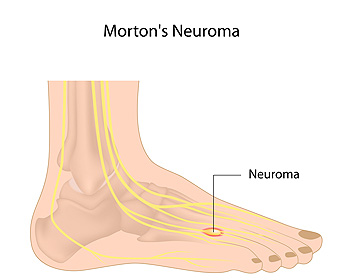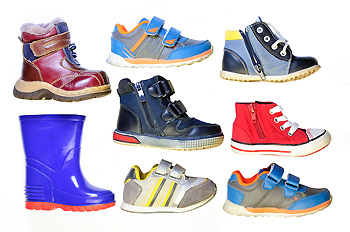Items filtered by date: March 2022
Stretches That May Relieve Pain from Morton Neuroma
 The nerve tissue between the third and fourth toes are affected when a condition known as Morton’s neuroma is present. It can cause significant pain, and some people say it feels as if there is a rock or pebble inside the ball of the foot. The most common pain consists of a stabbing or burning sensation that typically worsens over time. This condition can develop as a result from wearing shoes that are too narrow or from medical conditions like bunions, hammertoes, and flat feet. Mild relief may be found when the affected foot is elevated or massaged. It can also be beneficial to perform certain exercises to maintain and strengthen the arch of the foot. Fill a plastic bottle with ice and roll it back and forth along the bottom of the foot. (This will help with inflammation too) Another stretch can be performed while sitting down with your legs straight in front of you. Place the ball of your foot in the middle of a towel, then grab both ends of the towel and gently pull towards your shin. If you have pain in the ball of your foot, please schedule an appointment with a podiatrist who can properly diagnose and treat Morton’s neuroma.
The nerve tissue between the third and fourth toes are affected when a condition known as Morton’s neuroma is present. It can cause significant pain, and some people say it feels as if there is a rock or pebble inside the ball of the foot. The most common pain consists of a stabbing or burning sensation that typically worsens over time. This condition can develop as a result from wearing shoes that are too narrow or from medical conditions like bunions, hammertoes, and flat feet. Mild relief may be found when the affected foot is elevated or massaged. It can also be beneficial to perform certain exercises to maintain and strengthen the arch of the foot. Fill a plastic bottle with ice and roll it back and forth along the bottom of the foot. (This will help with inflammation too) Another stretch can be performed while sitting down with your legs straight in front of you. Place the ball of your foot in the middle of a towel, then grab both ends of the towel and gently pull towards your shin. If you have pain in the ball of your foot, please schedule an appointment with a podiatrist who can properly diagnose and treat Morton’s neuroma.
Morton’s neuroma is a very uncomfortable condition to live with. If you think you have Morton’s neuroma, contact Anas Khoury, DPM of North Eastern Foot & Ankle Specialists. Our doctor will attend to all of your foot care needs and answer any of your related questions.
Morton’s Neuroma
Morton's neuroma is a painful foot condition that commonly affects the areas between the second and third or third and fourth toe, although other areas of the foot are also susceptible. Morton’s neuroma is caused by an inflamed nerve in the foot that is being squeezed and aggravated by surrounding bones.
What Increases the Chances of Having Morton’s Neuroma?
- Ill-fitting high heels or shoes that add pressure to the toe or foot
- Jogging, running or any sport that involves constant impact to the foot
- Flat feet, bunions, and any other foot deformities
Morton’s neuroma is a very treatable condition. Orthotics and shoe inserts can often be used to alleviate the pain on the forefront of the feet. In more severe cases, corticosteroids can also be prescribed. In order to figure out the best treatment for your neuroma, it’s recommended to seek the care of a podiatrist who can diagnose your condition and provide different treatment options.
If you have any questions, please feel free to contact our office located in Passaic, NJ . We offer the newest diagnostic and treatment technologies for all your foot care needs.
How to Choose Your Child’s Shoes
 Your child’s feet will grow very quickly in the first 5 years of their life. Proper footwear during this time is very important in order to allow the bones in the feet to grow straight. When your child is just a baby, the bones in the toes are very soft, and shoes and socks that are too tight can restrict these bones from growing properly. In fact, shoes are not necessary for children until they are walking on their own, and even then, they are only needed for walking outside. It is important to also make sure that your child’s shoes are fastened with either laces or Velcro in order to keep the heel from slipping out of the shoe. Parents who have further questions about what shoes their child should be wearing as they grow can consult with a podiatrist for further advice and recommendations.
Your child’s feet will grow very quickly in the first 5 years of their life. Proper footwear during this time is very important in order to allow the bones in the feet to grow straight. When your child is just a baby, the bones in the toes are very soft, and shoes and socks that are too tight can restrict these bones from growing properly. In fact, shoes are not necessary for children until they are walking on their own, and even then, they are only needed for walking outside. It is important to also make sure that your child’s shoes are fastened with either laces or Velcro in order to keep the heel from slipping out of the shoe. Parents who have further questions about what shoes their child should be wearing as they grow can consult with a podiatrist for further advice and recommendations.
Making sure that your children maintain good foot health is very important as they grow. If you have any questions, contact Anas Khoury, DPM of North Eastern Foot & Ankle Specialists. Our doctor can provide the care you need to keep you pain-free and on your feet.
Keeping Children's Feet Healthy
Having healthy feet during childhood can help prevent medical problems later in life, namely in the back and legs. As children grow, their feet require different types of care. Here are some things to consider...
Although babies do not walk yet, it is still very important to take care of their feet.
Avoid putting tight shoes or socks on his or her feet.
Allow the baby to stretch and kick his or her feet to feel comfortable.
As a toddler, kids are now on the move and begin to develop differently. At this age, toddlers are getting a feel for walking, so don’t be alarmed if your toddler is unsteady or ‘walks funny’.
As your child gets older, it is important to teach them how to take care of their feet.
Show them proper hygiene to prevent infections such as fungus.
Be watchful for any pain or injury.
Have all injuries checked by a doctor as soon as possible.
Comfortable, protective shoes should always be worn, especially at play.
If you have any questions please feel free to contact our office located in Passaic, NJ . We offer the newest diagnostic and treatment technologies for all your foot and ankle needs.
Potential Achilles Tendon Injuries
 If you feel the back of your ankle, you will notice the fibrous tissue that connects the heel bone to the calf muscle. This is known as the Achilles tendon. There are two injuries that commonly affect this tendon. The first, known as Achilles tendinopathy, occurs when there is pain on the back of the heel as a result of overuse. Common signs of Achilles tendinopathy include swelling, stiffness, and pain that is worse in the morning. The second injury is an Achilles tendon rupture or tear, which commonly occurs as a result of jumping and pivoting with a lot of force. This causes the tendon to overstretch and eventually tear. Anyone who tears their Achilles tendon will notice a severe pain and a loss of both movement and strength in the tendon. If you are experiencing pain or swelling in your Achilles tendon, it is suggested that you consult with a podiatrist who can help provide a treatment option for injuries as well as ways to prevent a rupture.
If you feel the back of your ankle, you will notice the fibrous tissue that connects the heel bone to the calf muscle. This is known as the Achilles tendon. There are two injuries that commonly affect this tendon. The first, known as Achilles tendinopathy, occurs when there is pain on the back of the heel as a result of overuse. Common signs of Achilles tendinopathy include swelling, stiffness, and pain that is worse in the morning. The second injury is an Achilles tendon rupture or tear, which commonly occurs as a result of jumping and pivoting with a lot of force. This causes the tendon to overstretch and eventually tear. Anyone who tears their Achilles tendon will notice a severe pain and a loss of both movement and strength in the tendon. If you are experiencing pain or swelling in your Achilles tendon, it is suggested that you consult with a podiatrist who can help provide a treatment option for injuries as well as ways to prevent a rupture.
Achilles tendon injuries need immediate attention to avoid future complications. If you have any concerns, contact Anas Khoury, DPM of North Eastern Foot & Ankle Specialists. Our doctor can provide the care you need to keep you pain-free and on your feet.
What Is the Achilles Tendon?
The Achilles tendon is a tendon that connects the lower leg muscles and calf to the heel of the foot. It is the strongest tendon in the human body and is essential for making movement possible. Because this tendon is such an integral part of the body, any injuries to it can create immense difficulties and should immediately be presented to a doctor.
What Are the Symptoms of an Achilles Tendon Injury?
There are various types of injuries that can affect the Achilles tendon. The two most common injuries are Achilles tendinitis and ruptures of the tendon.
Achilles Tendinitis Symptoms
- Inflammation
- Dull to severe pain
- Increased blood flow to the tendon
- Thickening of the tendon
Rupture Symptoms
- Extreme pain and swelling in the foot
- Total immobility
Treatment and Prevention
Achilles tendon injuries are diagnosed by a thorough physical evaluation, which can include an MRI. Treatment involves rest, physical therapy, and in some cases, surgery. However, various preventative measures can be taken to avoid these injuries, such as:
- Thorough stretching of the tendon before and after exercise
- Strengthening exercises like calf raises, squats, leg curls, leg extensions, leg raises, lunges, and leg presses
If you have any questions please feel free to contact our office located in Passaic, NJ . We offer the newest diagnostic tools and technology to treat your foot and ankle needs.
